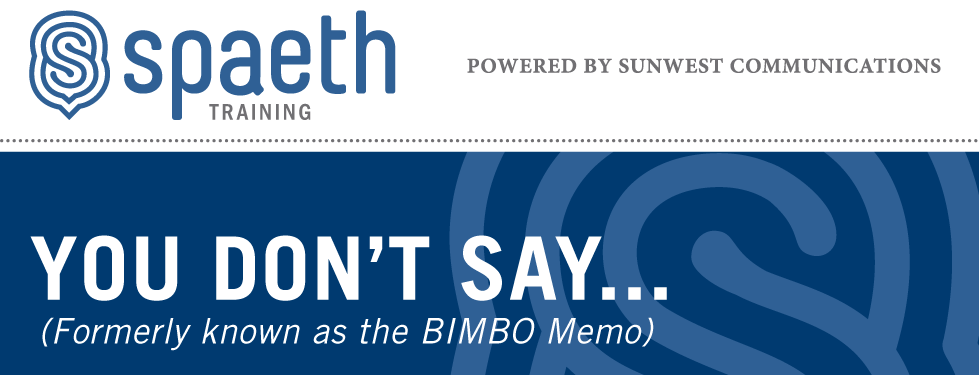[Newsletter] 8.20.24 | “Don’t call it ‘hush money’ judge says”
August 14, 2024What an interesting month! Examples of the power of a single word – one which is rendered s***– and one reappearing from 45 years ago. Depending on whether you heard Oklahoma State football coach Mike Gundy on ESPN or read the USA Today report, you might feel differently about his explanation about not disciplining a player charged with DUI. Columbia deans find out the answer to the question of “who’s watching what you text,” and lastly, we review three apologies: CenterPoint Energy, CrowdStrike and the Olympics. Two are OK; one is terrible.
THE WINNING COMMUNICATIONS BLUNDER
“Don’t call it ‘hush money’ judge says” was the sub headline of a news article about a courtroom skirmish between Cowboys owner Jerry Jones and back-and-forth lawsuits by and against the billionaire businessman. The issue is an agreement he made back in 1998 when he may or may not have fathered a daughter out-of-wedlock but did agree to a generous support deal in return for keeping the encounter confidential. They didn’t, suing Jones in 2022 for paternity. He countersued. Now they’re squabbling about who can say what about whom, but the federal judge has laid down the law (no pun intended). Don’t say ‘hush money.’ Now, don’t think of an elephant. DMN, “Judge rules Jerry Jones’ agreement with woman who says he is her dad is valid contract,” July 11, 2024
THE RUNNERS-UP
“DO NOT feed the alligator” was the advisory from the City of Coppell in North Dallas. An alligator has been spotted and caught on cell phone videos (yes, plural) moving between small ponds and creeks. The advisory continued with the unanticipated and unwelcome news that “American alligators are a regulated species and cannot be relocated” without a special waiver from state authorities. First, we hope some enterprising bureaucrat has filled out the form. But next – are we showing our lack of desire for adventure? It didn’t occur to us to feed the alligator until we saw the warning. Austin American-Statesman, “Coppell warns of alligators after sighting in backyard creek. Are they native to Texas?” July 12, 2024
“Did not mean to steer anybody wrong,” said White House press secretary Karine Jean-Pierre when confronted with a seeming contradiction between telling reporters that President Biden had not had a medical examination before or after the June 27 debate with former president Trump and Biden’s reported comment to a group of governors that he had taken a Covid and one other test. The discussion also included sparring about whether a specialist in neurology and Parkinson’s disease who was revealed to have visited the White House at least eight times, had seen or spoken to the president or the White House physician. We feel for KJP and think she or her order givers certainly meant to steer the usually pliant press corps in the direction of minimizing the president’s medical condition. She’s doing the best she can with the limited information she’s given.
The Hill, “White House spars with press over Parkinson’s specialist visits, Biden’s health,” July 8, 2024
THE POWER OF A WORD
“It is an adjective, a noun, a verb and most often an exclamation,” wrote New York Times reporter Rory Smith trying not to actually use the word spoken by Gary Lineker describing the English draw against Denmark in the European Championship on his podcast titled “The Rest is Football.” Interested readers had to google around to discover they were referring to the “s-word,” usually rendered s— or s—t. The news story itself is fascinating as an explanation “reduced to its core elements, then, it might be hard – particularly to outsiders – to understand why the word has caused such consternation.” It turns out, finally, that the dismay was less directed at the team’s performance and more a reflection of a very British debate about whether analysts should promote the home team or were free to call them “an adjective” like the one not so clearly spelled out above.
The NY Times, “At Euro 2024, a Very England Fight Misses the Point,” June 29, 2024
“Malaise” was the word remembered from a speech president Jimmy Carter gave on July 15, 1979. Readers send us most of the material we include in the YDS memo, and this backward look adds an important historic component to the current political controversies. I never heard or read Carter’s entire speech and was surprised to find it was initially praised as calling for Americans to be more self-reliant and more focused on helping others — in other words, a lot of what we say today. But he did use the word “malaise” to describe what he saw as the country’s state of mind, and the speech came to represent a description of the country and America as having lost confidence. Some think the speech cost Carter the election and certainly it stood in stark contrast with then-Governor Ronald Reagan’s message and personality.
This Day Of History, “JULY 15, 1979: JIMMY CARTER GIVES THE SPEECH THAT ENDED HIS PRESIDENCY,” July 14, 2024
WHAT NOT TO SAY (at least out loud)
“We can say these guys aren’t employees, but they’re really employees,” said Oklahoma State football coach Mike Gundy, explaining his decision not to discipline running back Ollie Gordon II who was arrested and charged with DUI, continuing “These guys get paid a lot of money, which is fine.” Gundy spent a rambling four minutes of commentary, which was excerpted in the national media as unconnected and impossibly insensitive comments, such as, “I told him you’re lucky you got out light because you make a lot of money to play football,” then expounding on how difficult it would have been to manage this kind of charge pre-NIL days. And “I’m saying that’s not an issue for him. So nobody got hurt.” But…if you watch the ESPN interview, you get a much more nuanced impression. Gundy did talk about how choices have lifelong impact. We’ll let sports watchers argue about whether Gordon should have been suspended and how this is one more example of money contaminating college sports. We’ll recommend it as an example of how an interview can be chopped up and edited – and will be, unless the interviewee thinks about what he wants quoted – beforehand.
ESPN, “Mike Gundy reveals his message with Ollie Gordon II after arrest,” July 9, 2024
USA Today, “Why Mike Gundy’s DUI comments are insane thing for college football coach to say,” July 10, 2024
TOPIC OF INTEREST
Who’s watching? Short answer: everybody, every minute! A New York Times headline read, “Columbia Removes Three Deans, Saying Texts Touched on ‘Antisemitic Tropes.’” Where were those texts found? Among other places, between faculty leadership sitting close or next to each other at a panel on antisemitism at the University. It appears that whoever was sitting behind or next to them was reading over their shoulders, saw enough, took pictures and sent them to a conservative political news site. That triggered an investigation and finally action by the president. Josef Sorett, Dean of Columbia College, caught in the interplay, tried to fight back calling it “an invasion of privacy,” which it was, but it was also too late for that excuse. Many business travelers working on airplanes use devices to shelter their computer screens from prying eyes, but this raises the issue of prying eyes to a new level.
The NY Times, “Columbia Removes Three Deans, Saying Texts Touched on ‘Antisemitic Tropes’,” July 8, 2024
APOLOGIZE?
Apologies are a unique topic. When your company has messed up, should the CEO apologize? If so, with what kind of words? When and in what format? By written statement, video, a town hall meeting or all of the above? This month offers interesting examples. First, as Hurricane Beryl hit Texas, CenterPoint Energy assured everyone it was ready. It wasn’t. And that it had prepared to handle the cleanup. It hadn’t. Two million people were without power, some for as many as ten days. The CEO, Jason Wells, was quoted in a statement and testified before an Austin commission on videotaped and widely circulated news reports saying he took personal responsibility, apologized and pledged to do better. We give him decent marks although his delivery of his remarks, which he mostly read, seemed scripted and pro forma.
Cyber security giant, CrowdStrike brought industries and companies to their knees when a software update went screwy and shut down or disrupted huge swaths of economies. CEO George Kurtz did multiple TV interviews around the world. He also apologized, said they were “deeply sorry” and managed on some of them to get in the corporate message that their “mission” was to protect customers. He looked somewhat flat, but we’ll cut him some slack as he probably had been up for 24 hours. However, would someone give him some advice about his hair? It was styled with a semi-mohawk combed to a point which may be a nod to youth but is definitely not the right look for television interviews direct to camera.
Both these examples demonstrate the importance of having the CEO involved, of using multiple routes of communication and of rehearsal so that the delivery comes across as heartfelt rather than corporate communication. We also advise a robust internal communication effort to enlist the most important ambassadors; the leadership and the employees. They all talk, and in these situations, they all get asked questions from friends and neighbors: “How did this happen and how are you fixing it!?”
More examples of topics for key areas – HR, Legal, communications – to raise before they need to be activated.
DMN, “CenterPoint CEO apologizes for Houston outages,” July 25, 2024
Sky News, “Mass IT outage hits companies including Sky News as planes grounded and train services affected,” July 19, 2024
By contrast, the Olympic opening ceremonies unaccountably included a drag queen parody of the Last Supper, one of Christianity’s most sacred moments. After a predictable uproar, the event organizers insisted “There was never an intention to show disrespect to any religious group,” and they intended to “celebrate community tolerance.” Other news reports included that they were “really, really sorry” to anyone who was offended. Doubling up on ‘really’ doesn’t make it more effective. Of course, they meant to ridicule Christians. The weasel line – “if anyone who was offended” – should never be used. You wouldn’t be apologizing if no one was offended.
Forbes, “Olympics Organizers Apologize After Drag Queen ‘Last Supper’ Slammed By Conservatives,” July 28, 2024
“You Don’t Say” is a reminder not to repeat and deny a negative word because of how the listener hears words. When you repeat and deny a negative word, the listener is likely to overlook the denial and hear the opposite of what the speaker is trying to say.

